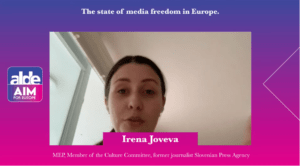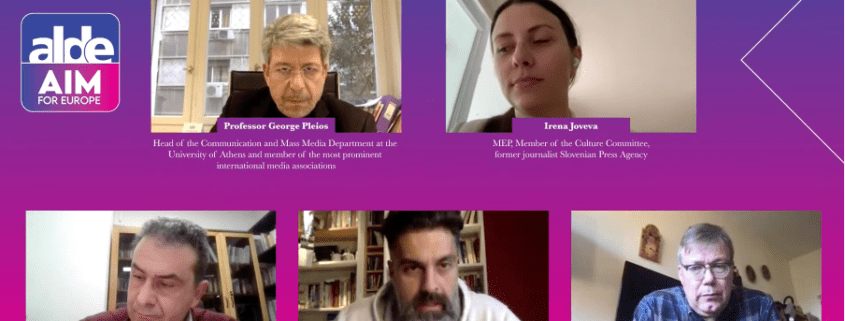On Monday, 28 February 2022, MEP Irena Joveva was invited by ALDE, the Alliance of Liberals and Democrats for Europe, to participate in a panel on media freedom in the EU. She based her contribution to the debate on the current situation in Ukraine, which she linked to some EU countries, and described some upcoming legislative proposals in this area.
MEP Joveva’s basic thesis was that Russia’s attack on Ukraine is possible mainly because the public and private media, or their editorial policy, are an extension of the Kremlin, as they follow its instructions and adapt their reporting to fit the government’s narrative, even if keeping to that narrative is absurd:
“Russian propaganda is telling its people that Russia is merely conducting a military operation in Ukraine because it is trying to topple the Nazis who are depriving the Ukrainian people of their freedom.”
According to Joveva, this is a clear example of how media freedom is important and essential, and above all not a given. She said that in the information age of social networks such a presentation of alternative facts will not be possible for long, and she praised the courage of all the journalists and correspondents who are willing to take risks in order to provide us with all the information from the ground.
In Russia, these elements can be observed in their extreme, but they are also manifesting themselves in a milder form in some EU countries, she said, explaining that she was referring in particular to Poland and Hungary, where the governments have already managed to completely subjugate the public media – just as the Janez Janša Government is trying to do now.
In extreme cases, such populist and authoritarian tendencies lead to murders of investigative journalists, even on EU soil, simply because they investigate and report on corruption. Joveva also mentioned other methods, although less aggressive, but which are still extremely harmful to media freedom, such as budget cuts, suspension of funding, funding cuts, journalist discreditations, strategic lawsuits, selling private media to pro-government oligarchs, etc.
 Joveva then outlined some of the legislative proposals: “The most important is the European Media Freedom Act, which should exclude the media sector from the current competition law and give it the special place it deserves. This would allow the European Commission to block controversial takeovers of some media outlets, such as the Polish attempt of a forced sale of TVN24 to the state-owned oil company, or the concentration of Hungarian capital close to Orban in Slovenia, which has become even more pronounced in recent years.”
Joveva then outlined some of the legislative proposals: “The most important is the European Media Freedom Act, which should exclude the media sector from the current competition law and give it the special place it deserves. This would allow the European Commission to block controversial takeovers of some media outlets, such as the Polish attempt of a forced sale of TVN24 to the state-owned oil company, or the concentration of Hungarian capital close to Orban in Slovenia, which has become even more pronounced in recent years.”
The next step, she said, should be to harmonise national legislation in the field of public service media, which would prevent politicians in power from exerting influence on public services. Another important piece of legislation is the so-called anti-SLAPP Directive, which would allow for a judicial mechanism for the dismissal of court proceedings in those cases that would be identified as strategic lawsuits against public participation. These practices are becoming more and more frequent, but their only goal is to silence journalists, as such lawsuits try to exhaust them so that they no longer report on corruption or abuse of public office.
All this – alongside the implementation of the Copyright Directive and the Audiovisual Media Services Directive – should benefit the media in Europe. But some challenges remain, cautioned Joveva, concluding her address by saying:
“But it is important to bear in mind what the experience in Russia is reminding us once again … that free and critical media are essential for the accountability of the authorities to the people, for democracy and, ultimately, for peace.”
A recording of the event can be viewed HERE.





Leave a Reply
Want to join the discussion?Feel free to contribute!